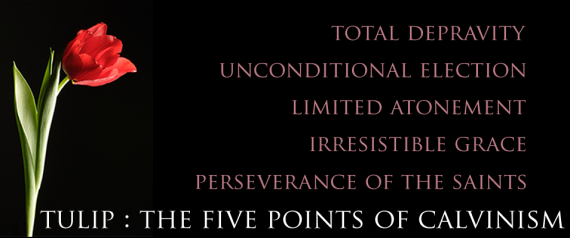
The Calvinistic doctrine of Unconditional Election is sometimes said to be the heart of Reformed theology (Boettner, Predestination, 96). It follows logically from the doctrine of Total Depravity (Seaton, Calvinism, 11).
Lorraine Boettner links the two doctrines with this explanation:
If the doctrine of Total Inability or Original Sin be admitted, the doctrine of Unconditional Election follows by the most inescapable logic. If, as the Scriptures and experience tell us, all men are by nature in a state of guilt and depravity from which they are wholly unable to deliver themselves and have no claim whatever on God for deliverance, it follows that if any are saved God must choose out those who shall be the objects of His grace (Boettner, Predestination, 95).
Edwin Palmer concurs:
If men are totally depraved and if some are still saved, then it is obvious that the reason some are saved and some are lost rests entirely with God. All of mankind would remain lost if left to itself and not chosen by God to be saved. … Therefore, if total depravity is Biblically true, then faith and consequent salvation come only when the Holy Spirit goes to work through regeneration. And the decision as to which persons He will work in must rest entirely, one hundred percent, with God, since man, being spiritually dead, cannot ask for help (Palmer, Five Points of Calvinism, 27).
 So if people are totally depraved (see the link list below) so that they cannot even believe in Jesus for eternal life or respond positively to God in any way, then God must unilaterally give eternal life to certain people.
So if people are totally depraved (see the link list below) so that they cannot even believe in Jesus for eternal life or respond positively to God in any way, then God must unilaterally give eternal life to certain people.
Who receives such a blessing?
According to Calvinism, God gives eternal life to those whom He chooses to give it. This is the doctrine of election, which we will consider over the next several blog posts.
Tomorrow’s post will provide numerous quotes from Calvinists on how they understand and explain Unconditional Election.
After this, we will look carefully at numerous texts from Scripture which are often used by Calvinists to defend the doctrine of Unconditional Election, and will suggest alternative explanations for these texts which fit better with their grammatical, cultural, theological, and historical contexts.
Finally, this series of posts on election will close with an explanation of what I believe the Bible teaches about election and predestination.
Until then, what questions and issues do you have about the biblical doctrines of election and predestination? Let me know below!
If you want to read more about Calvinism, check out other posts in this blog series: Words of Calvinism and the Word of God.



2 Peter 2:20; Luke 8:13, Luke 9:62; Galatians 4:9; Hebrews 6:4-6; Hebrews 10:38…….just to cite a few passages that debunk calvinism. Notice we refer to such teachings as “calvinism” and not Jesus or the apostles!
yes, but don’t forget…. “Calvinism is the gospel and the gospel is Calvinism” (according to some). 😉
But at what an awful price that Glory is obtained – the endless suffering of billions of human souls that God says He loves and longs to come to repentance. Hmm…if God wants them to come to repentance, and if they can’t repent unless He chooses, does that square with anyone? Either the doctrine is wrong (and borderline evil), or God isn’t who He says He is.
Absolutely true. An awful price for sure.
Yes, all good texts.
Many Calvinists, of course, claim that Calvinism is the Gospel and the Gospel is Calvinism, implying that Jesus was a Calvinist before John Calvin.
John chapter 6
My problem with this doctrine is that it means God could easily give saving faith to everyone but decides not to, allowing billions to burn forever in Hell.
Right. This is one of my problems as well. Apparently, those who are regenerated realize it is more special if others burn in hell.
Why damn those to hell for not believing when they weren’t given the faith/”elected” to believe? (circular reasoning)
I believe election has to do with service not Salvation. Not all who were elected were believers. sooooo 🙂
ntm, Christ is THE Elect. Is. 42:1
Election (as taught by Calvinist) is a doctrine of elitism & favoritism. They will go back to the Jews as a example of election, but choose the Jews to INCLUDE everyone else not exclude. God said he would make them a nation of priest, to the other nations.
My experience with Calvanist (not all-but most) is those who think they are ELECTED -which means SPECIAL, are better than others, they are arrogant and usually dismissive of anyone not of their bent.
My 2 questions to Calvanist is:
1) why is it God seems to elect mostly white American now
2) how do you know your elect & your not mistaken
Thanks Jeremy for this very sincere series.
>why is it God seems to elect mostly white American now
I recently read a claim that more converts were made in one day in third world countries, than in one year in the United States, Canada, and Europe, combined. Whilst I doubt the accuracy of that claim, it isn’t that far out of line with what we known about mission work, conversion rates, and how long ago the congregation was started.
None of the churches on the worldwide top twenty-five list of “largest church membership” are located in the United States.
None of the worldwide top ten churches, in terms of annual increase of members, is located in United States.
Depending upon how one defines “Sunday Morning attendence”, then one has to go to either the fifth, or thirty-fifth item of the worldwide list of “largest congregation” on Sunday morning.
The top twenty churches are closer to multi-campus churches, with no more than a two dozen people at each location, than to either your “50,000 people in the stadium”, or your “normal” multi-campus church with between 100 and 500 in attendence at each campus at one service on Sunday Morning.
what does foreknowledge mean and what is the difference between foreknowledge and foreseen faith
yes, yes, YES! I will be making this exact point. Any good books, resources you have read which I can reference on this point?
Yep. But this is all “for the praise of His glory” so that those upon whom He showed mercy might be more grateful for their mercy. At least, that is how it is sometimes explained….
will you please address the role of the sovereignty of God in Salvation
Hi Paul. Yes, I will be addressing this. It will take quite a while though. I will be addressing it as the “Sixth Point” of Calvinism near the end of my current blog series.
Is election the same thing as determinism?
Determinism (in connection with God, anyway) is God’s decision from all eternity what every single action and event would be. Election (according to Calvinists, anyway) is the decision from all eternity about who would receive eternal life.
Fair to say that election is a specific type of determinism (in connection with God)? A subset?
I have come to believe that you cannot talk about election or predestination with out foreknowledge.
Phil, yes, that is fair to say. You may not hear Calvinists talk much about determinism, but you will about predetermination, and as Dean points out, it is often in connection with foreknowledge.
A question for Paul Swilley, do you believe Jesus has the authority to give out eternal life?